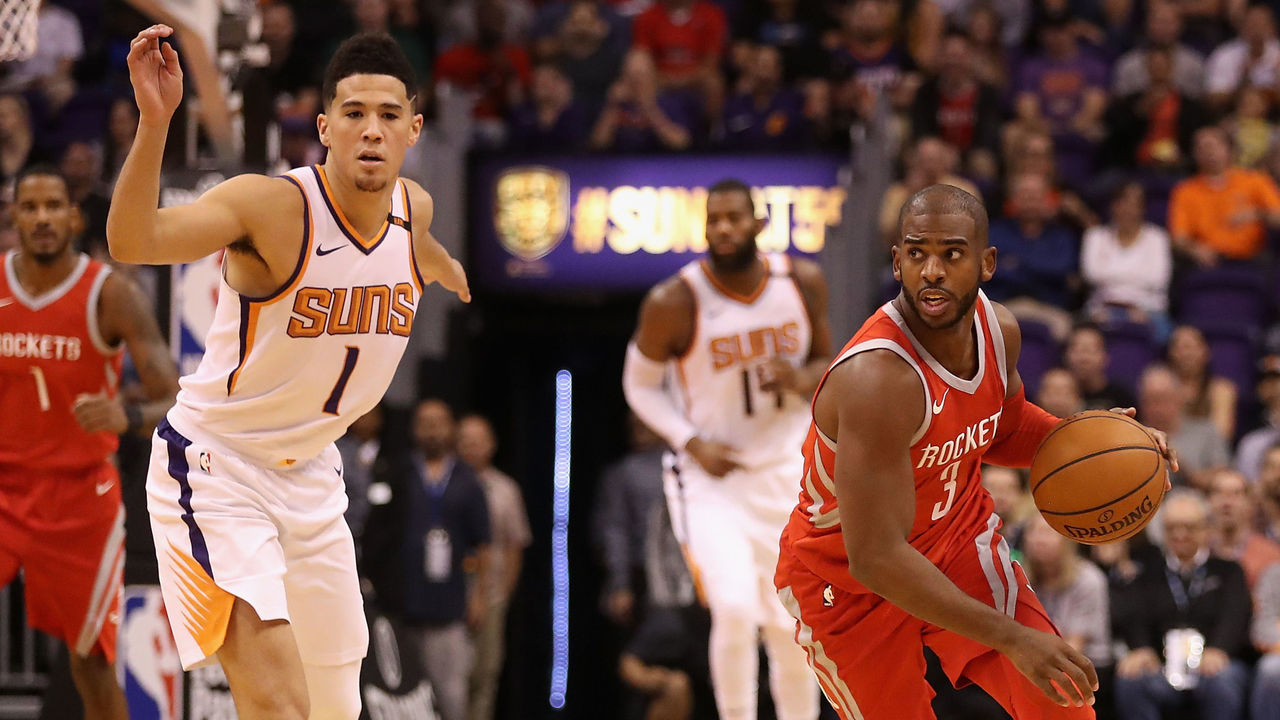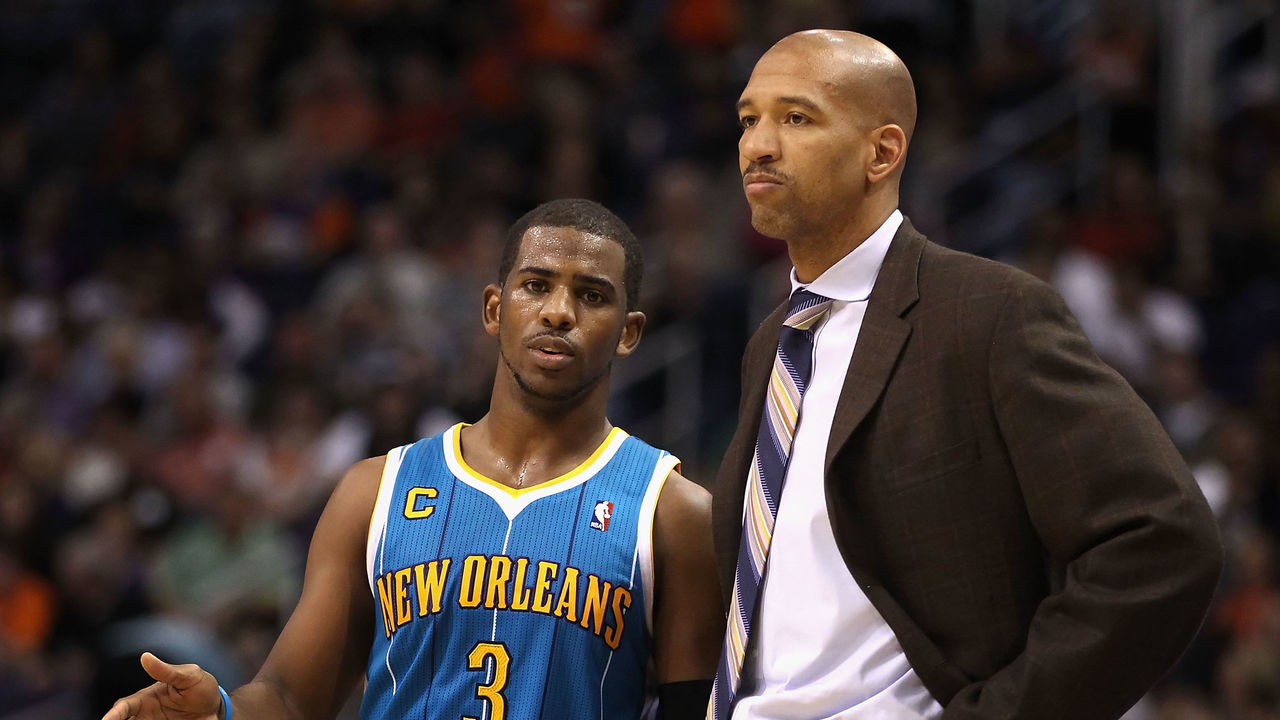The Suns get serious, and send a strong message to Devin Booker
The blockbuster trade between the Oklahoma City Thunder and Phoenix Suns on Monday tells a tale of two teams taking opposite approaches to this offseason.
The Thunder, who nabbed the fifth-seed and came up one possession short of the second round last year, looked at the hyper-congested Western Conference landscape and decided to zag while every other teams zigged. The Suns, who missed out on the eight-seed by a half-game after an 8-0 run in the bubble - marking their 10th straight season without a playoff berth - decided it was time to try to out-zig the competition.
And so, the Thunder are sending Chris Paul and Abdel Nader to the Suns for Kelly Oubre, Ricky Rubio, Ty Jerome, Jalen Lecque, and a top-12 protected 2022 first-round pick.
Oklahoma City already reportedly agreed to send Sixth Man of the Year runner-up Dennis Schroder to the Los Angeles Lakers, and it now owns 16 first-round picks - with swap rights on four of them - over the next six drafts. The Thunder will almost certainly look to add to that by flipping any or all of Steven Adams (on a $27-million expiring contract), Danny Green (acquired in the Schroder deal), Rubio, and Oubre, either this offseason or ahead of the 2021 trade deadline. They seem intent on stripping their roster for parts to further beef up their already-preposterous asset base.
What this means for the Suns is less clear, and far more interesting.
This is a great trade for Phoenix. The acquisition cost was relatively low; Oubre had a nice season last year, but it became clear in the bubble that Mikal Bridges and Cam Johnson were the Suns' wings of the future, so getting an All-NBA point guard without giving up either of them - or the 10th overall pick in Wednesday's draft - makes this a nice piece of win-now business. And despite his incongruous age, Paul should be a snug fit next to young cornerstones Devin Booker and Deandre Ayton.
The opportunity cost isn't particularly steep, either. Paul will tie up the Suns' cap space for the next two years, but they were unlikely to be major players in 2021 free agency and compromised very little of their long-term future. There's no guarantee that waiting things out would've given them an opportunity to land a star that better fits Booker and Ayton's timeline, and with the assets they gave up, it's hard to imagine them getting a better player than Paul.
When Paul's deal expires in 2022 (assuming he picks up his $44-million player option a year from now), Booker will still be only 26 and under contract for another two years. Perhaps by then the Suns will have washed off the stink of their past decade of bumbling incompetence and generated the kind of franchise equity that will make them an attractive free-agent destination. Most importantly, they'll have proven to Booker that they're serious about competing and also likely have gotten him some valuable playoff experience.
Paul is, above all else, a winner. He has a way of professionalizing teams, and he won't tolerate the kind of defensive negligence or bad habits that plagued the Suns in recent years. That persnickety attitude grated on teammates in the past, but he proved last season that he can also be a tremendous leader for a team in transition. Booker is a star in his own right, but he can learn a ton from playing with a basketball sage like Paul, whose guidance did wonders for young Thunder backcourt mate Shai Gilgeous-Alexander.

As far as how good the Suns can be, a lot of that will depend on how well Paul holds up in his age-36 and 37 seasons. He was remarkably durable last season, appearing in all but two games. Phoenix likely can't bank on a repeat, no matter how strongly Paul believes in the power of a plant-based diet. But if he can stay reasonably healthy and produce at something close to the level he did last season, the offensive potential of this team is sky-high.
On paper, this Suns supporting cast looks considerably stronger than the one Paul played with in 2019-20 when the Thunder went 44-28 and outscored teams by 6.9 points per 100 possessions with him on the floor. In Phoenix, he'll have more shooting around him, better wing play, a more dynamic co-lead playmaker, and a dramatically better pick-and-roll finisher. He's joining a team that finished 12th in offensive rating, and second inside the bubble.
Paul continues to drive a hyper-efficient offense (114 on-court offensive rating last year) with his brainy playmaking, self-creation, knock-down shooting from multiple levels, and masterful manipulation of space. His quickness has declined, and his free-throw and at-rim attempts have been in freefall for a while, but he's proven he doesn't need to dust bigs off the dribble to be effective.
He was probably the single most clutch player in basketball last year, which will be a boon to a team that's struggled badly to close games. He remains one of the league's best pick-and-roll orchestrators, and it's easy to imagine him carving up teams in a spread offense flanked by Booker, Johnson, and Bridges, with a soft-handed 7-footer in Ayton rolling down the gut. Paul and Booker instantly form one of the best backcourts in the league.
Booker is coming off an All-Star season in which he averaged nearly 27 points a game on 61.8% true shooting, bolstered by a career-best 54.9% mark from 2-point range, which is flat-out ridiculous for a high-usage guard. That efficiency was partly the product of ceding a large chunk of his on-ball responsibilities to Rubio and seeking out higher-percentage looks via off-ball movement. He scored 1.59 points per possession off cuts, putting him in the 95th percentile league-wide. Paul is an even better passer and offensive organizer than Rubio, and the threat of his shooting will open up the floor in a way his predecessor couldn't when Booker has the ball.
Though Paul has historically been extremely ball-dominant, he's shown he can adapt to playing alongside other high-usage ball-handlers, first with James Harden for the Houston Rockets and then with Gilgeous-Alexander and Schroder in Oklahoma City. He actually spent less time with the ball in his hands than Rubio did last year, according to NBA Advanced Stats.
Dual-ball-handler offenses bring all kinds of benefits, including the ability to stagger minutes and have one of them on the floor captaining the offense at all times. According to Synergy, Paul created an incredible 1.11 points per possession via shots and passes as a pick-and-roll ball-handler last year, while Booker created a more modest (but still robust) 1.01.
Those numbers could be even better with the two playing in tandem. They can serve as pressure releases for each other, whether by spotting up, relocating, or using ball reversals to flow from one pick-and-roll to the next. Paul hit 42.3% on catch-and-shoot threes last season, and Booker hit 39.3%. Between the two of them, the Suns should be one of the best pull-up mid-range shooting teams in the league.

However, we may see some tension at the offensive end between the motion- and pass-heavy system Monty Williams installed last year and Paul's probing, isolationist tendencies. The Suns ranked second in assist frequency last year, while the Thunder ranked 28th. The Thunder ranked third in isolation frequency, and the Suns ranked 29th. But Paul and Williams, who've collaborated in the past, should be able to meet somewhere in the middle.
The defense will be more of a question mark for this team, but unless he suffers a precipitous drop-off, Paul doesn't represent a downgrade from Rubio. He still has some of the best hands and help instincts in the game and is an expert screen-navigator, and his strength allows him to defend either guard spot, which could give cover to Booker in certain matchups.
As for the rest of the projected starting five: Bridges' footwork and ridiculous length make him one of the best wing defenders in the league, Johnson held up surprisingly well at the four as a rookie, and Ayton made huge strides as a rim-protector and pick-and-roll defender in his sophomore season. If all of that holds up, there's no reason Phoenix can't jump into the top half in defensive efficiency after finishing 17th last year.
This roster also isn't a finished product. The Suns still need to decide what to do with backup bigs Dario Saric, Aron Baynes, and Frank Kaminsky, and whether Cameron Payne, Jevon Carter, and Elie Okobo can be the extent of their guard depth. Along with that No. 10 pick, they'll have the $9.3-million non-taxpayer midlevel exception to play with. They can it use to target another guard (like old friend De'Anthony Melton), an Oubre replacement on the wing (though they did just fine without him in the bubble), or a power forward like Paul Millsap who can further shore up their frontcourt defense.
There's much work to be done, but as presently constructed, the Suns look like a solid playoff team. That doesn't mean they're a lock to make it; next year's West is going to be a torture chamber, and things will be particularly challenging with a division-heavy schedule since Phoenix resides in the stacked Pacific. The Suns are very much in the mix, though. They're not on the Lakers' or Los Angeles Clippers' level, and they may be a notch below the Golden State Warriors and Denver Nuggets, but they've launched themselves into the next tier of playoff contenders, among which they'll have a strong chance to crack the top eight and maybe even win a series.
That brings us back to Booker. Even with four years remaining on his max deal, the Suns were clearly feeling the pressure to give him a reason to believe in them. When it comes to struggling teams hoping to retain their homegrown stars, the clock starts ticking the moment they sign their rookie extensions. During Booker's torrid run in the bubble, his own peers were lobbying for him to get out of Phoenix.
Booker said two years ago he was fed up with missing the playoffs, and then the Suns proceeded to miss the playoffs two more times. Keeping him happy is the front office's No. 1 priority. If winning truly is his primary motivating factor right now, this move should unquestionably help do that.
HEADLINES
- Trae: 'Pain of staying the same' outweighed uncertainty in Hawks exit
- Ant becomes 3rd-youngest player to reach 10K points
- Carlisle gets 1,000th win as Pacers beat Hornets, snap 13-game skid
- Trae might be damaged goods, but he's a worthwhile bet for Wizards
- Heat-Bulls postponed due to slippery court conditions